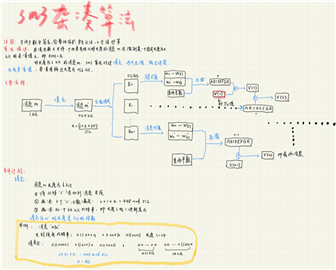
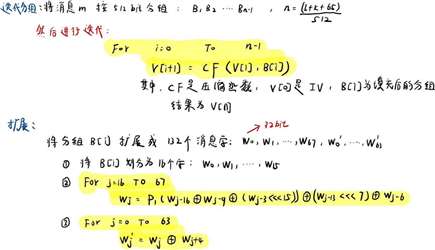
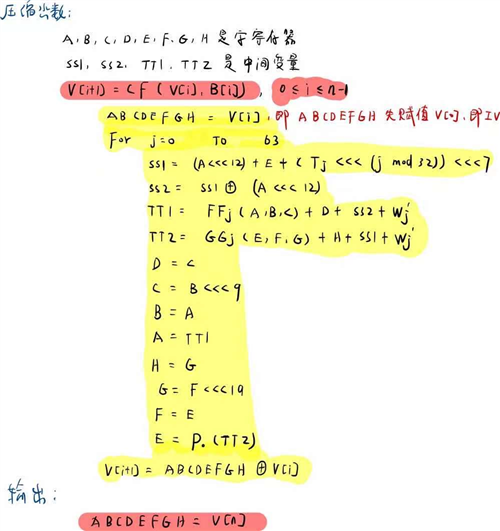
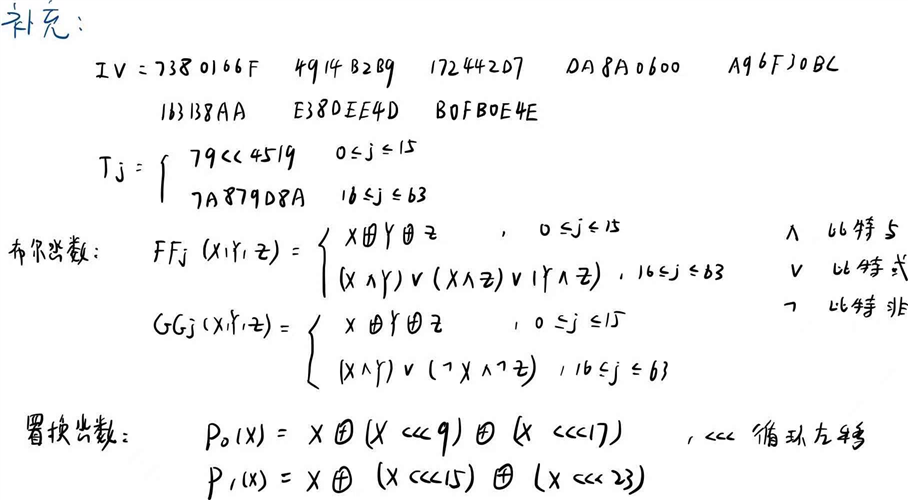
/************************************************************************
File name: SM3.c
Version: SM3_V1.1
Date: Sep 18,2016
Description: to calculate a hash message from a given message
Function List:
1.SM3_256 //calls SM3_init, SM3_process and SM3_done to calculate hash value
2.SM3_init //init the SM3 state
3.SM3_process //compress the the first len/64 blocks of the message
4.SM3_done //compress the rest message and output the hash value
5.SM3_compress //called by SM3_process and SM3_done, compress a single block of message
6.BiToW //called by SM3_compress,to calculate W from Bi
7.WToW1 //called by SM3_compress, calculate W1 from W
8.CF //called by SM3_compress, to calculate CF function.
9.BigEndian //called by SM3_compress and SM3_done.GM/T 0004-2012 requires to use
big-endian.
//if CPU uses little-endian, BigEndian function is a necessary call to
change the
//little-endian format into big-endian format.
10.SM3_SelfTest //test whether the SM3 calculation is correct by comparing the hash result
with the standard result
History:
1. Date: Sep 18,2016
Author: Mao Yingying, Huo Lili
Modification: 1)add notes to all the functions
2)add SM3_SelfTest function
**************************************************************************/
#include "SM3.h"
/******************************************************************************
Function: inputChar
Description: 输出
*******************************************************************************/
void inputChar(unsigned char* Msg, int len)
{
int i,count=0;
for (i = 0; i < len; i++)
{
printf("%02X\t", Msg[i]);
count++;
if ( count%8 == 0)
{
printf("\n");
}
}
}
/******************************************************************************
Function: inputInt
Description: 输出
*******************************************************************************/
void inputInt(unsigned int* Msg, int len)
{
int i, count = 0;
for (i = 0; i < len; i++)
{
printf("%08X\t", Msg[i]);
count++;
if (count % 8 == 0)
{
printf("\n");
}
}
}
/****************************************************************
Function: BiToW
Description: calculate W from Bi【消息扩展】
Calls:
Called By: SM3_compress
Input: Bi[16] //a block of a message
Output: W[64]
Return: null
Others: 将消息分组B[i]扩展生成132个消息字W和W1,这里生成的是W
****************************************************************/
void BiToW(unsigned int Bi[], unsigned int W[])
{
int i,count=0;
unsigned int tmp;
//消息扩展-A
//将消息分组B[i]划分为16个字W[i]
for (i = 0; i <= 15; i++)
{
W[i] = Bi[i];
}
//消息扩展-B
for (i = 16; i <= 67; i++)
{
tmp = W[i - 16]^ W[i - 9]^ SM3_rotl32(W[i - 3], 15);
W[i] = SM3_p1(tmp)^ (SM3_rotl32(W[i - 13], 7))^ W[i - 6];
}
inputInt(W, 68);
}
/*****************************************************************
Function: WToW1
Description: calculate W1 from W
Calls:
Called By: SM3_compress
Input: W[64]
Output: W1[64]
Return: null
Others: 将消息分组B[i]扩展生成132个消息字W和W1,这里生成的是W1
*****************************************************************/
void WToW1(unsigned int W[], unsigned int W1[])
{
int i;
//消息扩展-C,生成W1
for (i = 0; i <= 63; i++)
{
W1[i] = W[i] ^ W[i + 4];
}
inputInt(W1, 64);
}
/******************************************************************
Function: CF
Description: calculate the CF compress function and update V【压缩函数】
Calls:
Called By: SM3_compress
Input: W[64]
W1[64]
V[8]
Output: V[8]
Return: null
Others:
********************************************************************/
void CF(unsigned int W[], unsigned int W1[], unsigned int V[])
{
unsigned int SS1;
unsigned int SS2;
unsigned int TT1;
unsigned int TT2;
unsigned int A, B, C, D, E, F, G, H;
unsigned int T = SM3_T1;
unsigned int FF;
unsigned int GG;
int j;
printf("\n\n迭代压缩后的中间值:");
//ABCDEFGH=V0
A = V[0];
B = V[1];
C = V[2];
D = V[3];
E = V[4];
F = V[5];
G = V[6];
H = V[7];
printf("\nj\tA\t B\t C\t D\t E\t F\t G\t H\n");
printf("\n\t%08X %08X %08X %08X %08X %08X %08X %08X\n", A, B, C, D, E, F, G, H);
for (j = 0; j <= 63; j++)
{
//SS1
if (j == 0)
{
T = SM3_T1;
}
else if (j == 16)
{
T = SM3_rotl32(SM3_T2, 16);
}
else
{
T = SM3_rotl32(T, 1);
}
SS1 = SM3_rotl32((SM3_rotl32(A, 12) + E + T), 7);
//SS2
SS2 = SS1 ^ SM3_rotl32(A, 12);
//TT1
if (j <= 15)
{
FF = SM3_ff0(A, B, C);
}
else
{
FF = SM3_ff1(A, B, C);
}
TT1 = FF + D + SS2 + *W1;
W1++;
//TT2
if (j <= 15)
{
GG = SM3_gg0(E, F, G);
}
else
{
GG = SM3_gg1(E, F, G);
}
TT2 = GG + H + SS1 + *W;
W++;
//D
D = C;
//C
C = SM3_rotl32(B, 9);
//B
B = A;
//A
A = TT1;
//H
H = G;
//G
G = SM3_rotl32(F, 19);
//F
F = E;
//E
E = SM3_p0(TT2);
printf("\n%d\t%08X %08X %08X %08X %08X %08X %08X %08X\n", j,A, B, C, D, E, F, G, H);
}
//update V
V[0] = A ^ V[0];
V[1] = B ^ V[1];
V[2] = C ^ V[2];
V[3] = D ^ V[3];
V[4] = E ^ V[4];
V[5] = F ^ V[5];
V[6] = G ^ V[6];
V[7] = H ^ V[7];
}
/******************************************************************************
Function: BigEndian
Description: 大端,高字节存放在低地址,低字节存放在高地址
Calls:
Called By: SM3_compress, SM3_done
Input: src[bytelen]
bytelen
Output: des[bytelen]
Return: null
Others: src and des could implies the same address
*******************************************************************************/
void BigEndian(unsigned char src[], unsigned int bytelen, unsigned char des[])
{
unsigned char tmp = 0;
unsigned int i = 0;
for (i = 0; i < bytelen / 4; i++)
{
tmp = des[4 * i];
des[4 * i] = src[4 * i + 3];
src[4 * i + 3] = tmp;
tmp = des[4 * i + 1];
des[4 * i + 1] = src[4 * i + 2];
des[4 * i + 2] = tmp;
}
}
/******************************************************************************
Function: SM3_init
Description: initiate SM3 state
Calls:
Called By: SM3_256
Input: SM3_STATE *md
Output: SM3_STATE *md
Return: null
Others:
*******************************************************************************/
void SM3_init(SM3_STATE* md)
{
//将IV存于md->state中,即V中
md->curlen = md->length = 0;
md->state[0] = SM3_IVA;
md->state[1] = SM3_IVB;
md->state[2] = SM3_IVC;
md->state[3] = SM3_IVD;
md->state[4] = SM3_IVE;
md->state[5] = SM3_IVF;
md->state[6] = SM3_IVG;
md->state[7] = SM3_IVH;
}
/******************************************************************************
Function: SM3_compress
Description: compress a single block of message
Calls: BigEndian
BiToW
WToW1
CF
Called By: SM3_256
Input: SM3_STATE *md
Output: SM3_STATE *md
Return: null
Others:
*******************************************************************************/
void SM3_compress(SM3_STATE* md)
{
//将消息分组B[i]扩展生成132个消息字W0,W1,...,W67,W‘0,W‘1,...,W‘63
unsigned int W[68]; //存储W
unsigned int W1[64]; //存储W‘
//字存储为大端格式,坐标为高有效位,右边为低有效位
BigEndian(md->buf, 64, md->buf);
//消息扩展
printf("\n\n扩展后的消息:");
printf("\n\n*******W0,W1,...,W67*******:\n");
BiToW((unsigned int*)md->buf, W);
printf("\n\n*******W‘0,W‘1,...,W‘63*******:\n");
WToW1(W, W1);
//压缩函数(W,W1,V[i])
CF(W, W1, md->state);
}
/******************************************************************************
Function: SM3_process
Description: compress the first (len/64) blocks of message【迭代过程】
Calls: SM3_compress
Called By: SM3_256
Input: SM3_STATE *md
unsigned char buf[len] //the input message
int len //bytelen of message
Output: SM3_STATE *md
Return: null
Others:
*******************************************************************************/
void SM3_process(SM3_STATE* md, unsigned char* buf, int len)
{
//将填充后的消息m‘按512比特进行分组为B0,B1,...,Bn-1
int n = 1;//消息分组的个数
while (len--)
{
/* copy byte */
md->buf[md->curlen] = *buf++;
md->curlen++;
/* is 64 bytes full? 即是否是512比特为一组*/
if (md->curlen == 64)
{
printf("\n\n第%d个消息分组:\n\n",n);
SM3_compress(md);
md->length += 512;
n++;
md->curlen = 0;
}
}
}
/******************************************************************************
Function: SM3_done
Description: compress the rest message that the SM3_process has left behind
Calls: SM3_compress
Called By: SM3_256
Input: SM3_STATE *md
Output: unsigned char *hash
Return: null
Others:
*******************************************************************************/
void SM3_done(SM3_STATE* md, unsigned char hash[])
{
int i,count=1;
unsigned char tmp = 0;
/* increase the bit length of the message 增长1字节的长度*/
md->length += md->curlen << 3;
/* append the ‘1‘ bit 首先将比特‘1‘添加到消息的末尾*/
md->buf[md->curlen] = 0x80;
md->curlen++;
/* if the length is currently above 56 bytes, appends zeros till
it reaches 64 bytes, compress the current block, creat a new
block by appending zeros and length,and then compress it
若当前长度超过56字节(512比特),则添加0直到64字节,然后迭代压缩
*/
if (md->curlen > 56)
{
for (; md->curlen < 64;)
{
md->buf[md->curlen] = 0;
md->curlen++;
}
//64字节为一组进行迭代压缩
SM3_compress(md);
//长度置0,重新创建新块
md->curlen = 0;
}
/* if the length is less than 56 bytes, pad upto 56 bytes of zeroes
若长度小于56字节,则填充0至56个字节
*/
for (; md->curlen < 56;)
{
md->buf[md->curlen] = 0;
md->curlen++;
}
/* since all messages are under 2^32 bits we mark the top bits zero
由于所有消息都在2^32位以下,故将最高位标记为0
*/
for (i = 56; i < 60; i++)
{
md->buf[i] = 0;
}
/* append length 添加一个64比特串,该比特串是长度为l的二进制表示*/
md->buf[63] = md->length & 0xff;
md->buf[62] = (md->length >> 8) & 0xff;
md->buf[61] = (md->length >> 16) & 0xff;
md->buf[60] = (md->length >> 24) & 0xff;
printf("\n*******填充后的消息*******:\n");
inputChar(md->buf, 64);
SM3_compress(md);
/* copy output */
memcpy(hash, md->state, SM3_len / 8);
//if CPU uses little-endian, BigEndian function is a necessary call
BigEndian(hash, SM3_len / 8, hash);
}
/******************************************************************************
Function: SM3_256
Description: calculate a hash value from a given message
Calls: SM3_init
SM3_process
SM3_done
Called By:
Input: unsigned char buf[len] //the input message
int len //bytelen of the message
Output: unsigned char hash[32]
Return: null
Others:
*******************************************************************************/
void SM3_256(unsigned char buf[], int len, unsigned char hash[])
{
SM3_STATE md;
SM3_init(&md);
SM3_process(&md, buf, len);
SM3_done(&md, hash);
}
/******************************************************************************
Function: SM3_SelfTest
Description: test whether the SM3 calculation is correct by comparing
the hash result with the standard result
Calls: SM3_256
Called By:
Input: null
Output: null
Return: 0 //the SM3 operation is correct
1 //the sm3 operation is wrong
Others:
*******************************************************************************/
void SM3_SelfTest()
{
unsigned int i = 0, a = 1, b = 1;
int choose;
printf("请选择输入示例:1.示例1\t\t2.示例2\n");
scanf("%d", &choose);
if (choose == 1)
{
//示例1
unsigned char Msg1[3] = { 0x61,0x62,0x63 };// ASCII码
int MsgLen1 = 3;
unsigned char MsgHash1[32] = { 0 }; //生成的Hash值
printf("\n*******输入的字符串消息*******:\n");
inputChar(Msg1, MsgLen1);
/*
unsigned char StdHash1[32] = { 0x66,0xC7,0xF0,0xF4,0x62,0xEE,0xED,0xD9,0xD1,0xF2,0xD4,0x6B,0xDC,0x10,0xE4,0xE2,
0x41,0x67,0xC4,0x87,0x5C,0xF2,0xF7,0xA2,0x29,0x7D,0xA0,0x2B,0x8F,0x4B,0xA8,0xE0 };//已经计算好的Hash值
*/
SM3_256(Msg1, MsgLen1, MsgHash1);
printf("\n*******输出杂凑值*******:\n");
inputChar(MsgHash1, 32);
}
else if (choose == 2)
{
//示例2
unsigned char Msg2[64] = { 0x61,0x62,0x63,0x64,0x61,0x62,0x63,0x64,0x61,0x62,0x63,0x64,0x61,0x62,0x63,0x64,
0x61,0x62,0x63,0x64,0x61,0x62,0x63,0x64,0x61,0x62,0x63,0x64,0x61,0x62,0x63,0x64,
0x61,0x62,0x63,0x64,0x61,0x62,0x63,0x64,0x61,0x62,0x63,0x64,0x61,0x62,0x63,0x64,
0x61,0x62,0x63,0x64,0x61,0x62,0x63,0x64,0x61,0x62,0x63,0x64,0x61,0x62,0x63,0x64 };// ASCII码
int MsgLen2 = 64;
unsigned char MsgHash2[32] = { 0 };//生成的Hash值
printf("\n*******输入的字符串消息*******:\n");
inputChar(Msg2, MsgLen2);
/*
unsigned char StdHash2[32] = { 0xde,0xbe,0x9f,0xf9,0x22,0x75,0xb8,0xa1,0x38,0x60,0x48,0x89,0xc1,0x8e,0x5a,0x4d,
0x6f,0xdb,0x70,0xe5,0x38,0x7e,0x57,0x65,0x29,0x3d,0xcb,0xa3,0x9c,0x0c,0x57,0x32 };//已经计算好的Hash值
*/
SM3_256(Msg2, MsgLen2, MsgHash2);
printf("\n*******输出杂凑值*******:\n");
inputChar(MsgHash2, 32);
}
else
printf("输入错误,请重新输入!\n");
//比较是否相同
/*
a = memcmp(MsgHash1, StdHash1, SM3_len / 8);
b = memcmp(MsgHash2, StdHash2, SM3_len / 8);
if ((a == 0) && (b == 0))
{
return 0;
}
else
{
return 1;
}
*/
}
int main()
{
printf("*********************************************************\n");
printf("*\t\t\tSM3密码杂凑算法\t\t\t*\n");
printf("*********************************************************\n\n");
SM3_SelfTest();
printf("\n");
system("pause");
return 0;
}
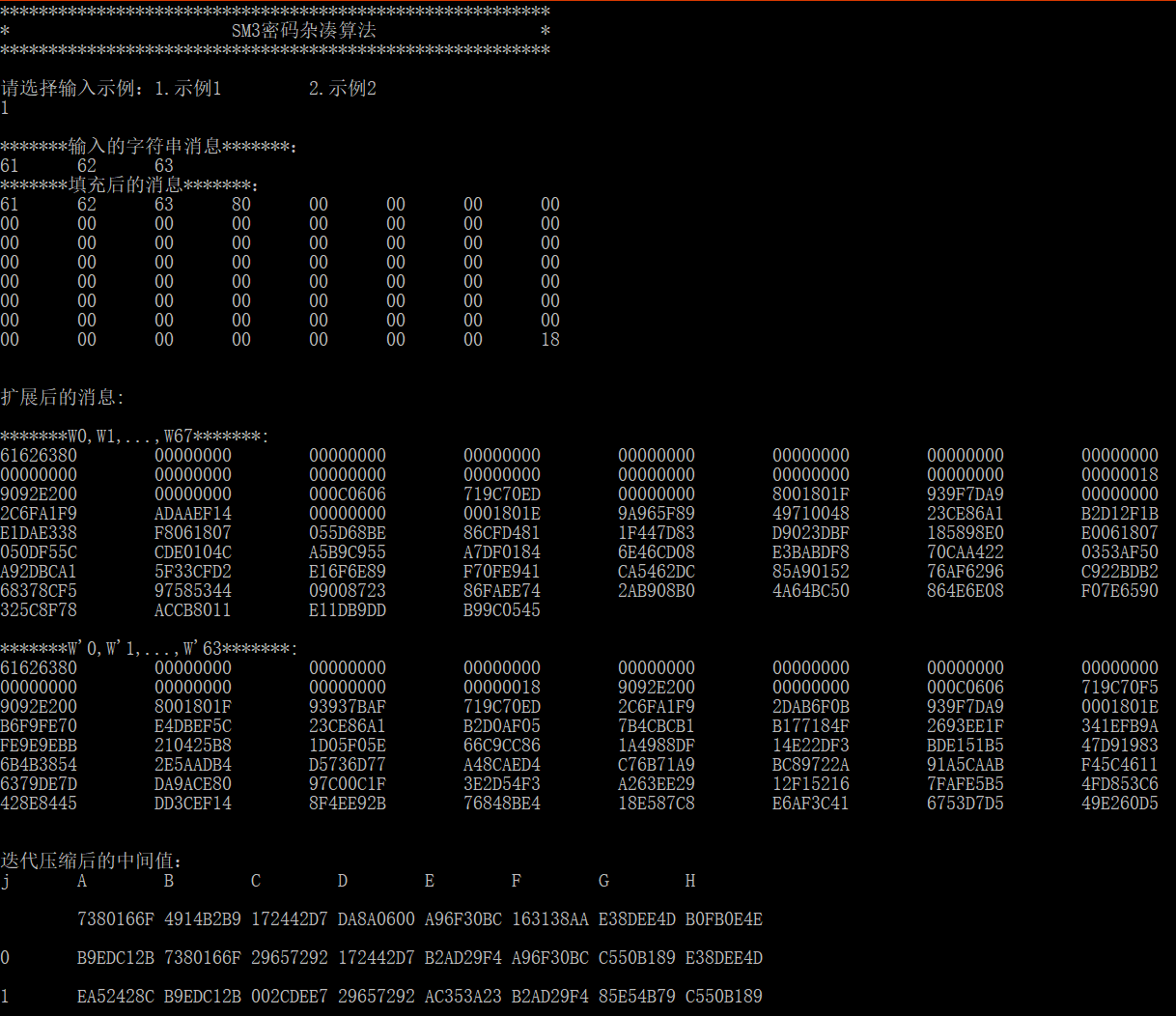
注:全部代码见github
1、国标-SM3
2、商用密码检测中心-源码下载
3、密码学-基础理论与应用(李子臣著)
原文:https://www.cnblogs.com/pam-sh/p/14746481.html